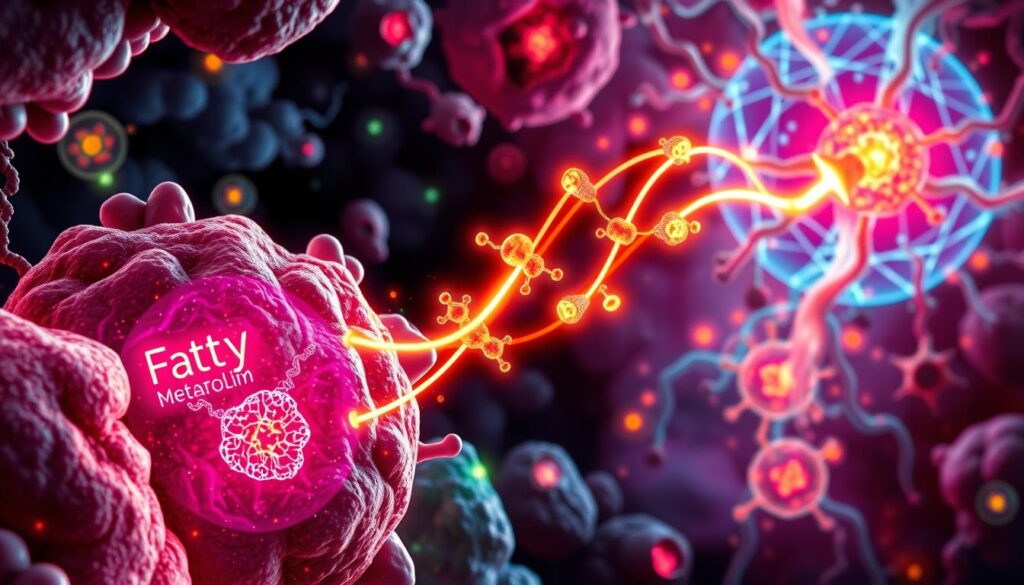Did you know the average Australian adult has about 26 pounds of extra fat? Learning about fat metabolism is key to losing weight and reaching your ideal weight. We’ll explore the science behind breaking down fats and using them for energy. This can help you manage your weight better.
Key Takeaways
- Fat metabolism involves the breakdown and utilization of lipids for energy.
- Understanding the process of lipolysis, or lipid breakdown, is crucial for weight management.
- Adipose tissue serves as a storage depot for excess energy, which can be mobilized and used during periods of caloric deficit.
- Optimizing fat metabolism through exercise and dietary strategies can enhance your weight loss efforts.
- Effective weight management requires a holistic approach that includes both metabolic regulation and lifestyle modifications.
What is Fat Metabolism?
Fat metabolism is a key process in our bodies. It involves breaking down, using, and storing fats. This system is important for managing weight, producing energy, and keeping us healthy. Lipolysis and the function of adipose tissue are two main parts of fat metabolism.
Lipolysis: The Breakdown of Lipids
Lipolysis breaks down fats into smaller parts for energy. The body releases hormones to start this process. These hormones help release fatty acids from adipose tissue, where we store extra energy.
These fatty acids then go through fatty acid oxidation. This process makes energy in the form of ATP.
Adipose Tissue: The Storage Depot
Adipose tissue, or fat tissue, stores extra energy as triglycerides. It’s key in lipid mobilization, releasing fats when we need energy. When we need energy, the body uses the stored triglycerides in adipose tissue.
These triglycerides are broken down through lipolysis. They then help produce ketone bodies. These can be used as an alternative energy source.
Knowing how fat metabolism works is vital. It helps us understand how to manage weight and improve our health.
Fat Metabolism and Weight Management
Many people aim to keep a healthy weight. Understanding how fat metabolism helps is key. Your body’s ability to break down fat affects your weight. Learning about this connection can help you reach your goals.
Your fat metabolism is how your body uses fat for energy. When it works well, it helps with weight management. But, if it doesn’t, you might gain too much weight.
Many things affect how well you metabolize fat. Your dietary habits, physical activity levels, and metabolic regulation are important. Making smart choices in these areas can improve your fat metabolism. This supports your weight management goals.

Next, we’ll share ways to boost your fat metabolism. This will give you the tools to manage your weight better. Stay with us as we explore more about fat metabolism and its impact on your health.
Optimizing Fat Metabolism
To help you manage your weight, it’s key to know how to boost your fat metabolism. You can do this by exercising and eating the right foods. This way, your body can use fats as a great energy source.
Exercise and Fat Metabolism
Exercise is crucial for better fat metabolism. Activities like running, lifting weights, and HIIT help break down fat. These exercises burn calories during and after you work out.
Dietary Strategies for Efficient Fat Metabolism
Your diet also affects how well you metabolize fat. Eating foods rich in healthy fats, like avocados and nuts, helps. Also, make sure you get enough protein and control your carb intake. This supports your body’s fat metabolism.
FAQ
What is fat metabolism and how does it work?
Fat metabolism is how your body uses fats for energy. It involves breaking down fats and turning them into energy. This process helps your body use stored fat and balance its energy needs.
What is the role of adipose tissue in fat metabolism?
Adipose tissue stores extra energy as fat. When you eat more than you need, this excess is stored in fat tissue. Later, your body can break down this fat for energy.
How does fat metabolism impact weight management?
Your body’s ability to burn fat affects your weight. Slow fat metabolism can lead to weight gain. But, a good metabolism helps use stored fat for energy, aiding in weight loss.
What are some strategies for improving fat metabolism?
To boost fat metabolism, try these: 1. Exercise regularly, focusing on fat-burning activities. 2. Eat a balanced diet rich in healthy fats, proteins, and carbs. 3. Get enough sleep and manage stress to help your body regulate fat metabolism. 4. Stay hydrated and consider supplements like omega-3s or MCT oil.
How does ketosis affect fat metabolism?
Ketosis makes your body use fat and ketones for energy instead of glucose. This state can be reached through fasting, low-carb diets, or exercise. In ketosis, your body is better at using fat for energy, aiding in weight management.

